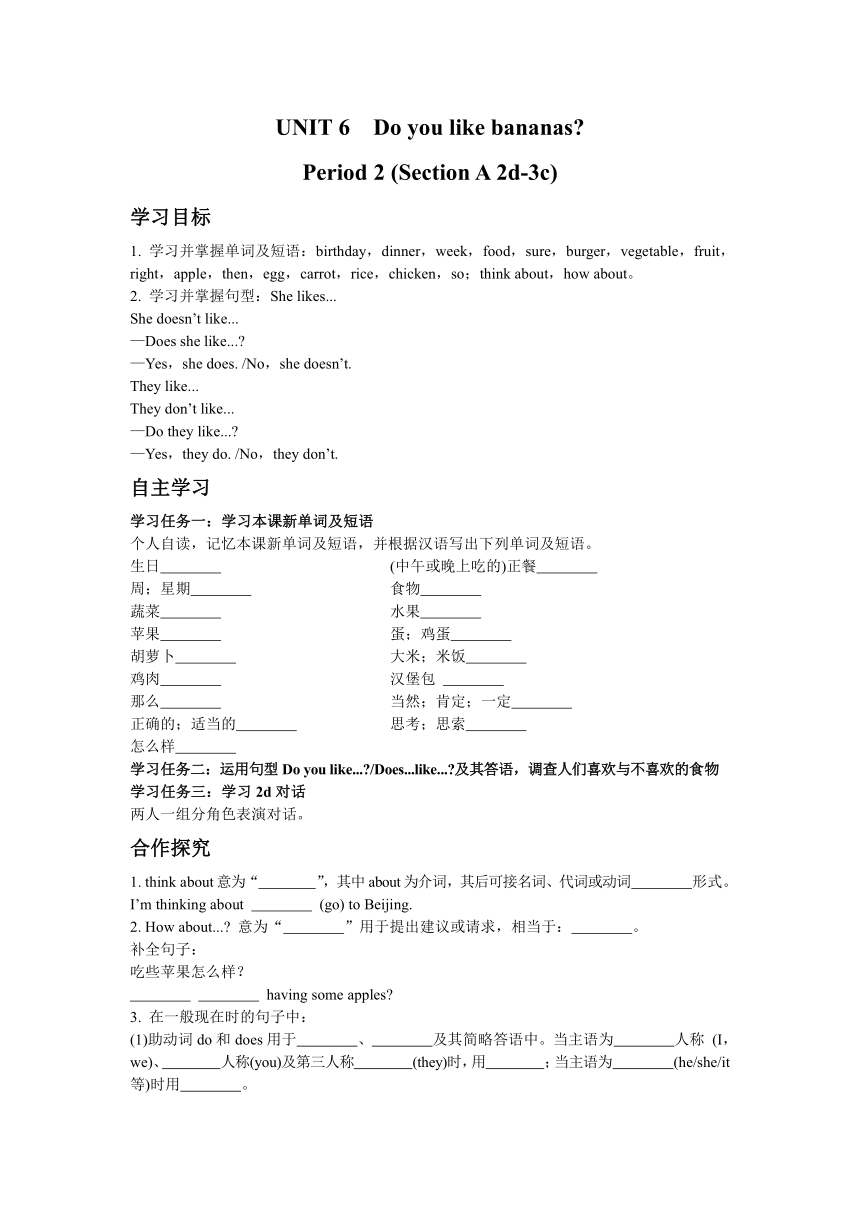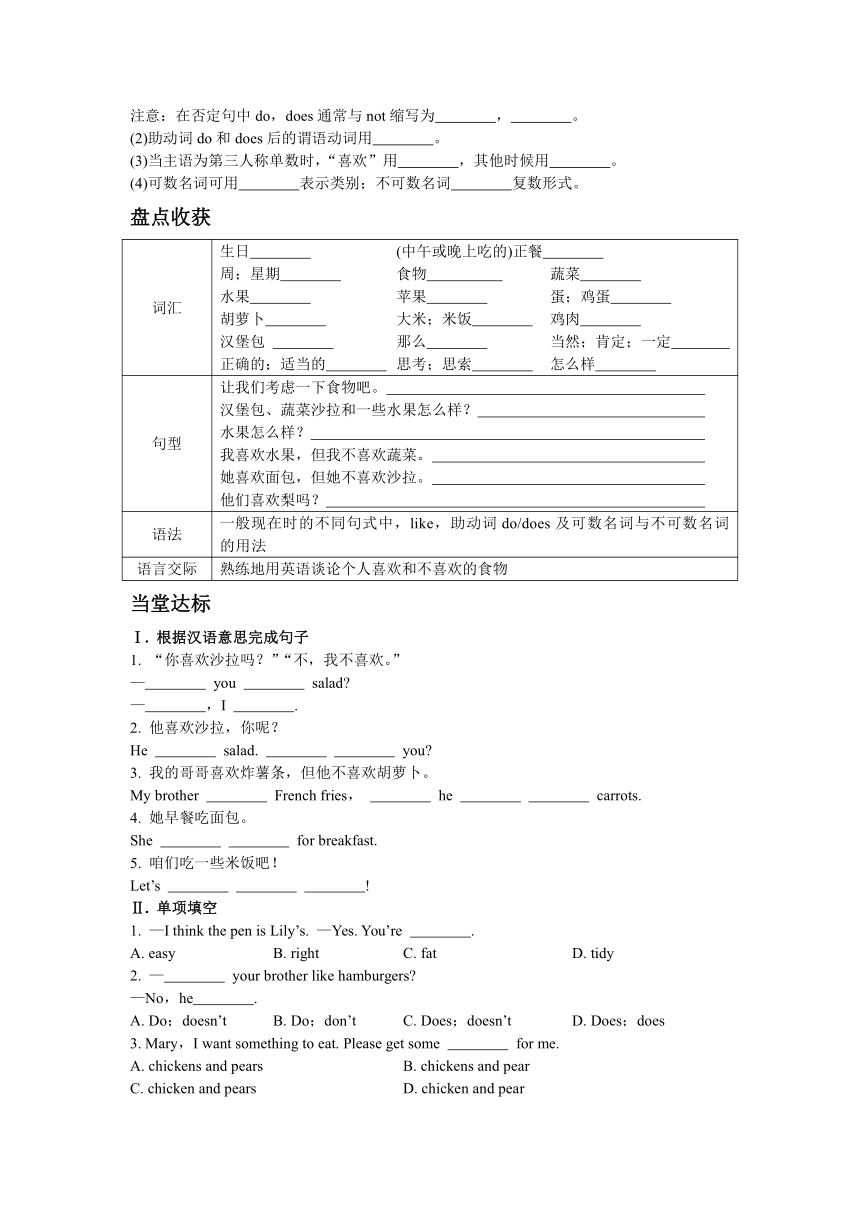Unit 6 Do you like bananas-Period 2(Section A 2d-3c)导学案(含解析)
文档属性
| 名称 | Unit 6 Do you like bananas-Period 2(Section A 2d-3c)导学案(含解析) |

|
|
| 格式 | docx | ||
| 文件大小 | 19.6KB | ||
| 资源类型 | 教案 | ||
| 版本资源 | 人教新目标(Go for it)版 | ||
| 科目 | 英语 | ||
| 更新时间 | 2023-08-31 08:22:29 | ||
图片预览


文档简介
UNIT 6 Do you like bananas
Period 2 (Section A 2d-3c)
学习目标
1. 学习并掌握单词及短语:birthday,dinner,week,food,sure,burger,vegetable,fruit,right,apple,then,egg,carrot,rice,chicken,so;think about,how about。
2. 学习并掌握句型:She likes...
She doesn’t like...
—Does she like...
—Yes,she does. /No,she doesn’t.
They like...
They don’t like...
—Do they like...
—Yes,they do. /No,they don’t.
自主学习
学习任务一:学习本课新单词及短语
个人自读,记忆本课新单词及短语,并根据汉语写出下列单词及短语。
生日 (中午或晚上吃的)正餐
周;星期 食物
蔬菜 水果
苹果 蛋;鸡蛋
胡萝卜 大米;米饭
鸡肉 汉堡包
那么 当然;肯定;一定
正确的;适当的 思考;思索
怎么样
学习任务二:运用句型Do you like... /Does...like... 及其答语,调查人们喜欢与不喜欢的食物
学习任务三:学习2d对话
两人一组分角色表演对话。
合作探究
1. think about意为“ ”,其中about为介词,其后可接名词、代词或动词 形式。
I’m thinking about (go) to Beijing.
2. How about... 意为“ ”用于提出建议或请求,相当于: 。
补全句子:
吃些苹果怎么样?
having some apples
3. 在一般现在时的句子中:
(1)助动词do和does用于 、 及其简略答语中。当主语为 人称 (I,we)、 人称(you)及第三人称 (they)时,用 ;当主语为 (he/she/it等)时用 。
注意:在否定句中do,does通常与not缩写为 , 。
(2)助动词do和does后的谓语动词用 。
(3)当主语为第三人称单数时,“喜欢”用 ,其他时候用 。
(4)可数名词可用 表示类别;不可数名词 复数形式。
盘点收获
词汇 生日 (中午或晚上吃的)正餐 周;星期 食物 蔬菜 水果 苹果 蛋;鸡蛋 胡萝卜 大米;米饭 鸡肉 汉堡包 那么 当然;肯定;一定 正确的;适当的 思考;思索 怎么样
句型 让我们考虑一下食物吧。 汉堡包、蔬菜沙拉和一些水果怎么样? 水果怎么样? 我喜欢水果,但我不喜欢蔬菜。 她喜欢面包,但她不喜欢沙拉。 他们喜欢梨吗?
语法 一般现在时的不同句式中,like,助动词do/does及可数名词与不可数名词的用法
语言交际 熟练地用英语谈论个人喜欢和不喜欢的食物
当堂达标
Ⅰ. 根据汉语意思完成句子
1. “你喜欢沙拉吗?”“不,我不喜欢。”
— you salad
— ,I .
2. 他喜欢沙拉,你呢?
He salad. you
3. 我的哥哥喜欢炸薯条,但他不喜欢胡萝卜。
My brother French fries, he carrots.
4. 她早餐吃面包。
She for breakfast.
5. 咱们吃一些米饭吧!
Let’s !
Ⅱ. 单项填空
1. —I think the pen is Lily’s. —Yes. You’re .
A. easy B. right C. fat D. tidy
2. — your brother like hamburgers
—No,he .
A. Do;doesn’t B. Do;don’t C. Does;doesn’t D. Does;does
3. Mary,I want something to eat. Please get some for me.
A. chickens and pears B. chickens and pear
C. chicken and pears D. chicken and pear
4. Look! The chicken on the plate (盘子) and the pears in the bag.
A. is;is B. are;are C. is;are D. are;is
5. —Next week is David’s birthday. Let’s the birthday dinner.
—OK. How about some vegetables and fruit
A. come on B. think about C. ask for D. play with
Ⅲ. 按要求完成下列各题
1. Linda and Tom like French fries. (改为否定句)
Linda and Tom French fries.
2. Does Tom like eggs for breakfast (作肯定回答)
, .
3. My teacher plays basketball. (改为一般疑问句)
your teacher basketball
4. She doesn’t have lunch at home. (改为肯定句)
She lunch at home.
5. What about going to Beijing next week (改为同义句)
going to Beijing next week?
Ⅳ. 完形填空
Hello! My name is David Smith. My first name is David. I play sports every day and I am very 1 .
I eat lots of fruit and 2 . For fruit,I like apples,oranges, 3 and bananas. For vegetables,I like 4 and carrots. I don’t like ice-cream. I like chicken 5 dinner every day.
I like sports and I often play 6 . I run in the morning. I like Lin Shuhao. Do you 7 him Yeah,he is a 8 player(运动员). I think he plays basketball really 9 . I like 10
basketball,too. I play it every afternoon. It’s relaxing.
Healthy food and lots of sports make(使得)me healthy.
1. A. good B. healthy C. boring D. easy
2. A. eggs B. milk C. vegetables D. rice
3. A. ice-cream B. hamburgers C. bread D. pears
4. A. tomatoes B. oranges C. apples D. chicken
5. A. of B. for C. in D. on
6. A. it B. them C. its D. they
7. A. know B. call C. have D. meet
8. A. basketball B. football C. baseball D. volleyball
9. A. nice B. good C. very D. well
10. A. play B. plays C. played D. playing
学后反思
____________________________________________________________________________________________________________________________________________________________________________________________________________________________________________________________________________________________________________________________
当堂达标答案与解析:
Ⅰ. 1. Do,like;No,don’t 2. likes;What (How) about
3. likes,but,doesn’t like 4. eats bread 5. have some rice
Ⅱ. 1. B easy“容易的”;right“正确的”;fat“肥胖的”;tidy“整洁的”。结合句意“我认为这支钢笔是莉莉的。”“是的。你是对的。”可知,选B。
2. C 这是含有实义动词like的一般疑问句。当主语是第三人称单数时用助动词does,后面的动词like用原形。肯定回答用“Yes,he does.”,否定回答用“No,he doesn’t.”。故选C。
3. C 句中的some既可以修饰可数名词复数,也可以修饰不可数名词。chicken作“鸡肉”讲时,是不可数名词;pear是可数名词,此处用复数。故选C。
4. C 句中的chicken是不可数名词,故后面的be动词用is;pears是可数名词的复数形式,故后面的be动词用are。
5. B come on“快点”;think about“考虑”;ask for“请求”;play with“与……玩耍”。根据句意可知,选B。
Ⅲ. 1. don’t like 2. Yes,he does 3. Does,play 4. has 5. How about
Ⅳ. 1. B 由前半句“我每天做运动”可知此处意为“我很健康”,故选B。
2. C 根据下文的vegetables可得出答案。
3. D 空格所在句提到的是水果,而选项中只有D项pears“梨”是水果,故选D。
4. A 只有A项tomatoes“西红柿”是蔬菜,故选A。
5. B 介词for可与一日三餐名词搭配使用,表示各餐所吃的食物,故选B。
6. B 此处代词代替上文的复数sports,在句中作play的宾语,故应用宾格形式them(它们)。
7. A 结合上下文语境可知,此处应表示“你(们)知道他吗?”
know“知道”;call“打电话”;have“有”;meet“遇到”。故选A。
8. A 由常识可知,林书豪是一名篮球运动员。
9. D 联系上文“林书豪是一名篮球运动员”可知,此处应表达“他篮球打得很好”。此处应用副词well来修饰动词play,故选D。
10. D like doing sth. 意为“喜欢做某事”,表示一种习惯性的行为,故选D。
Period 2 (Section A 2d-3c)
学习目标
1. 学习并掌握单词及短语:birthday,dinner,week,food,sure,burger,vegetable,fruit,right,apple,then,egg,carrot,rice,chicken,so;think about,how about。
2. 学习并掌握句型:She likes...
She doesn’t like...
—Does she like...
—Yes,she does. /No,she doesn’t.
They like...
They don’t like...
—Do they like...
—Yes,they do. /No,they don’t.
自主学习
学习任务一:学习本课新单词及短语
个人自读,记忆本课新单词及短语,并根据汉语写出下列单词及短语。
生日 (中午或晚上吃的)正餐
周;星期 食物
蔬菜 水果
苹果 蛋;鸡蛋
胡萝卜 大米;米饭
鸡肉 汉堡包
那么 当然;肯定;一定
正确的;适当的 思考;思索
怎么样
学习任务二:运用句型Do you like... /Does...like... 及其答语,调查人们喜欢与不喜欢的食物
学习任务三:学习2d对话
两人一组分角色表演对话。
合作探究
1. think about意为“ ”,其中about为介词,其后可接名词、代词或动词 形式。
I’m thinking about (go) to Beijing.
2. How about... 意为“ ”用于提出建议或请求,相当于: 。
补全句子:
吃些苹果怎么样?
having some apples
3. 在一般现在时的句子中:
(1)助动词do和does用于 、 及其简略答语中。当主语为 人称 (I,we)、 人称(you)及第三人称 (they)时,用 ;当主语为 (he/she/it等)时用 。
注意:在否定句中do,does通常与not缩写为 , 。
(2)助动词do和does后的谓语动词用 。
(3)当主语为第三人称单数时,“喜欢”用 ,其他时候用 。
(4)可数名词可用 表示类别;不可数名词 复数形式。
盘点收获
词汇 生日 (中午或晚上吃的)正餐 周;星期 食物 蔬菜 水果 苹果 蛋;鸡蛋 胡萝卜 大米;米饭 鸡肉 汉堡包 那么 当然;肯定;一定 正确的;适当的 思考;思索 怎么样
句型 让我们考虑一下食物吧。 汉堡包、蔬菜沙拉和一些水果怎么样? 水果怎么样? 我喜欢水果,但我不喜欢蔬菜。 她喜欢面包,但她不喜欢沙拉。 他们喜欢梨吗?
语法 一般现在时的不同句式中,like,助动词do/does及可数名词与不可数名词的用法
语言交际 熟练地用英语谈论个人喜欢和不喜欢的食物
当堂达标
Ⅰ. 根据汉语意思完成句子
1. “你喜欢沙拉吗?”“不,我不喜欢。”
— you salad
— ,I .
2. 他喜欢沙拉,你呢?
He salad. you
3. 我的哥哥喜欢炸薯条,但他不喜欢胡萝卜。
My brother French fries, he carrots.
4. 她早餐吃面包。
She for breakfast.
5. 咱们吃一些米饭吧!
Let’s !
Ⅱ. 单项填空
1. —I think the pen is Lily’s. —Yes. You’re .
A. easy B. right C. fat D. tidy
2. — your brother like hamburgers
—No,he .
A. Do;doesn’t B. Do;don’t C. Does;doesn’t D. Does;does
3. Mary,I want something to eat. Please get some for me.
A. chickens and pears B. chickens and pear
C. chicken and pears D. chicken and pear
4. Look! The chicken on the plate (盘子) and the pears in the bag.
A. is;is B. are;are C. is;are D. are;is
5. —Next week is David’s birthday. Let’s the birthday dinner.
—OK. How about some vegetables and fruit
A. come on B. think about C. ask for D. play with
Ⅲ. 按要求完成下列各题
1. Linda and Tom like French fries. (改为否定句)
Linda and Tom French fries.
2. Does Tom like eggs for breakfast (作肯定回答)
, .
3. My teacher plays basketball. (改为一般疑问句)
your teacher basketball
4. She doesn’t have lunch at home. (改为肯定句)
She lunch at home.
5. What about going to Beijing next week (改为同义句)
going to Beijing next week?
Ⅳ. 完形填空
Hello! My name is David Smith. My first name is David. I play sports every day and I am very 1 .
I eat lots of fruit and 2 . For fruit,I like apples,oranges, 3 and bananas. For vegetables,I like 4 and carrots. I don’t like ice-cream. I like chicken 5 dinner every day.
I like sports and I often play 6 . I run in the morning. I like Lin Shuhao. Do you 7 him Yeah,he is a 8 player(运动员). I think he plays basketball really 9 . I like 10
basketball,too. I play it every afternoon. It’s relaxing.
Healthy food and lots of sports make(使得)me healthy.
1. A. good B. healthy C. boring D. easy
2. A. eggs B. milk C. vegetables D. rice
3. A. ice-cream B. hamburgers C. bread D. pears
4. A. tomatoes B. oranges C. apples D. chicken
5. A. of B. for C. in D. on
6. A. it B. them C. its D. they
7. A. know B. call C. have D. meet
8. A. basketball B. football C. baseball D. volleyball
9. A. nice B. good C. very D. well
10. A. play B. plays C. played D. playing
学后反思
____________________________________________________________________________________________________________________________________________________________________________________________________________________________________________________________________________________________________________________________
当堂达标答案与解析:
Ⅰ. 1. Do,like;No,don’t 2. likes;What (How) about
3. likes,but,doesn’t like 4. eats bread 5. have some rice
Ⅱ. 1. B easy“容易的”;right“正确的”;fat“肥胖的”;tidy“整洁的”。结合句意“我认为这支钢笔是莉莉的。”“是的。你是对的。”可知,选B。
2. C 这是含有实义动词like的一般疑问句。当主语是第三人称单数时用助动词does,后面的动词like用原形。肯定回答用“Yes,he does.”,否定回答用“No,he doesn’t.”。故选C。
3. C 句中的some既可以修饰可数名词复数,也可以修饰不可数名词。chicken作“鸡肉”讲时,是不可数名词;pear是可数名词,此处用复数。故选C。
4. C 句中的chicken是不可数名词,故后面的be动词用is;pears是可数名词的复数形式,故后面的be动词用are。
5. B come on“快点”;think about“考虑”;ask for“请求”;play with“与……玩耍”。根据句意可知,选B。
Ⅲ. 1. don’t like 2. Yes,he does 3. Does,play 4. has 5. How about
Ⅳ. 1. B 由前半句“我每天做运动”可知此处意为“我很健康”,故选B。
2. C 根据下文的vegetables可得出答案。
3. D 空格所在句提到的是水果,而选项中只有D项pears“梨”是水果,故选D。
4. A 只有A项tomatoes“西红柿”是蔬菜,故选A。
5. B 介词for可与一日三餐名词搭配使用,表示各餐所吃的食物,故选B。
6. B 此处代词代替上文的复数sports,在句中作play的宾语,故应用宾格形式them(它们)。
7. A 结合上下文语境可知,此处应表示“你(们)知道他吗?”
know“知道”;call“打电话”;have“有”;meet“遇到”。故选A。
8. A 由常识可知,林书豪是一名篮球运动员。
9. D 联系上文“林书豪是一名篮球运动员”可知,此处应表达“他篮球打得很好”。此处应用副词well来修饰动词play,故选D。
10. D like doing sth. 意为“喜欢做某事”,表示一种习惯性的行为,故选D。
同课章节目录
- starters 预备篇(2012秋审查)
- Unit 1 Good morning !
- Unit 2 What’s this in English?
- Unit 3 What color is it ?
- Unit 1 My name's Gina.
- Section A
- Section B
- Unit 2 This is my sister.
- Section A
- Section B
- Unit 3 Is this your pencil?
- Section A
- Section B
- Unit 4 Where's my schoolbag?
- Section A
- Section B
- Unit 5 Do you have a soccer ball?
- Section A
- Section B
- Unit 6 Do you like bananas?
- Section A
- Section B
- Unit 7 How much are these socks?
- Section A
- Section B
- Unit 8 When is your birthday?
- Section A
- Section B
- Unit 9 My favorite subject is science.
- Section A
- Section B
